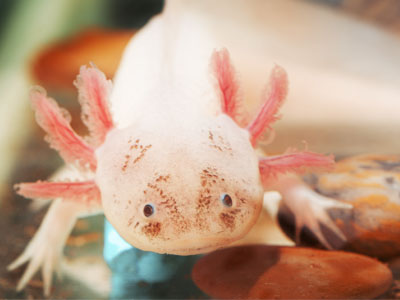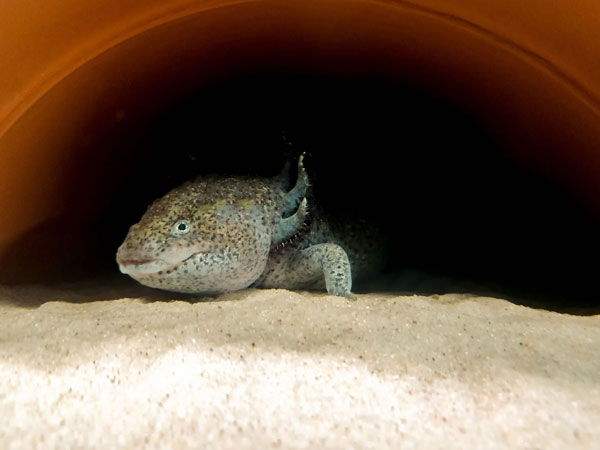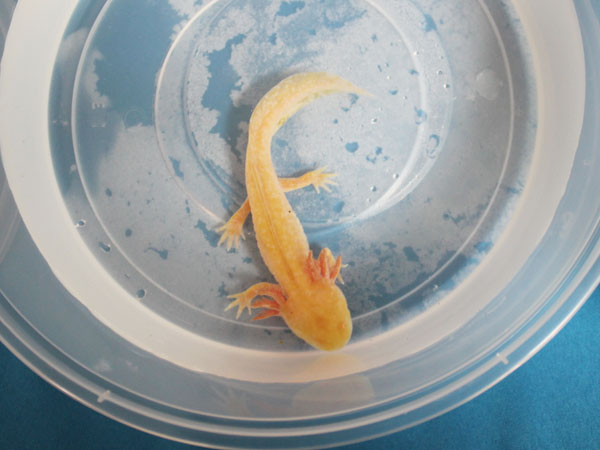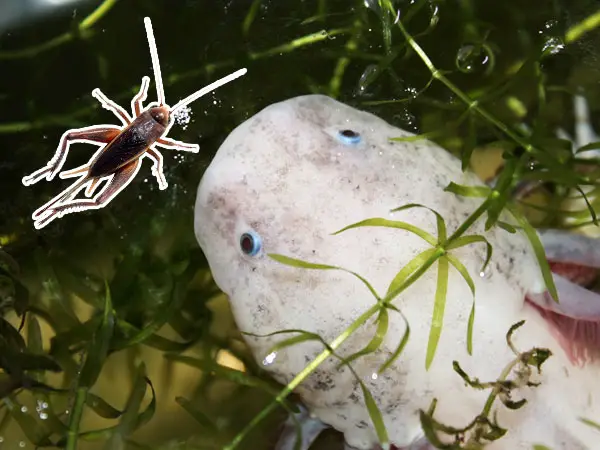
Some aquarists report hearing their axolotls make strange noises like squeaking or barking. Is there any truth to these claims? Do axolotls make noise? Are they capable of making any sounds?
If you go on Youtube, you’ll probably find a few videos of axolotls swimming to the surface and making a noise. Other aquarists report hearing their axies doing a strange voice when feeding or when their axies are being handled.
Even though axolotls don’t have vocal cords, you can sometimes hear them doing weird sounds that are like a little hiccup or a small squeak.
Why do axolotls make these sounds? Do all axolotls make them? And should you be worried about your axies making these noises?
Do Axolotls Bark?
No, axolotls don’t bark. In fact, axolotls don’t have any vocal organs, nor can they hear voices, but they do sense vibrations.
While axolotls do make some noise, calling it a bark is a strong overstatement. At best, you’ll hear your lotl doing a little squeak.
However, most axolotls don’t make any noise. They are very silent creatures that haven’t developed any vocal cords. Plus, evolutionary speaking, there isn’t a need for them to be vocal.
They don’t have any mating calls, they don’t need sounds to scare away predators since they’re at the top of the food chain in their natural habitat, and they don’t rely on echolocation to get around in the water.
What they do have instead is poor eyesight and a lateral line system (receptors that pick up vibrations in the water) on which they rely to get around in the water.
Therefore, not only that axolotls don’t bark, they usually don’t make noises either. With a few exceptions, of course, which can be explained by the fact that axolotls have lungs.
Why Do Axolotls Make Noises?
The reason why axolotls sometimes do make strange noises may have to do with how they breathe. Axolotls breathe using four different methods – through their gills, lungs, skin and back of the throat (Buccopharyngeal membrane).
Of these methods, buccal respiration and breathing through their lungs may offer some explanation to the noises axolotls make.
Swallowing Air Bubbles
When breathing through the Buccopharyngeal membrane or when breathing through their rather rudimentary lungs, they may emit low sounds that may get the attention of their owners.
When using their lungs to breathe, axolotls usually swim to the surface of the water and gulp for air, sending the air bubble to their lungs.
They may even use the air bubble to float around in the tank, and then release it as a little burp. Whether they do this out of playfulness or necessity (low oxygen levels or low water levels in the tank), depends on the conditions in which the axolotl is being kept.
Seeing an axolotl breaking the surface of the water and swallowing air bubbles is not out of the ordinary, and the phenomenon may also explain the sounds axolotls make.
Many owners report hearing these little hiccup-like or burping noises when their pet lotl swims up to the surface and swallows an air bubble.
However, if you see your pet lotls doing this incessantly, there may be something wrong in your aquarium.
Bad Water Parameters
When water parameters are bad and axolotls can’t rely on breathing through their gills and skin, they will resort to breathing through their lungs and in doing so they’ll swim to the surface to gulp for air.
Another instance when owners report hearing their axolotls being vocal is when they are handled (e.g. taken out of the aquarium, for example to be moved to another location).
Now, if you’re handling your axie carefully and not squeezing it (which you should never do!), the noise they make is once again probably got to do with them breathing outside of the aquarium.
Other aquarists say they hear their lotl making a sound when eating. Because they use their buccal pouch when eating as well, they once again be making a sound because of how their eating mechanisms operates.
Therefore, even though most axolotl owners will never hear their axie making any sounds, there may be situations when trapped air or the stimulation of buccal pouch may produce a little squeaking sound.
What to Do If Your Axolotl Is Making Noises?
If you hear your axolotl making noises or interesting sounds and swimming too often to the surface for air, you should first check if all water parameters are within the acceptable range.
Check that the water temperature is right, check for toxin levels (ammonia and nitrates), pH and water hardness.
If everything seems in order and your axie isn’t showing any signs of disease (constipation, trapped gas, impaction, etc.), then you’re most probably in the presence of an axolotl than is more “vocal” than others.
As I mentioned, this phenomenon is not something that lotl owners usually experience, but even if it does happen, the reason behind it can be explained by the mechanism by which axolotls breathe and eat.
To rule out other things, however, do make sure you’re monitoring water conditions and keeping a clean and healthy tank environment for your lotl.
And if you notice your axie being vocal, do make a video of it and post it on social media channels, so we can all enjoy the little squeaks, burps and hiccups that your axie makes.
Conclusion
While making sound and noises is atypical of axolotls, an axolotl making a sound when breaking the surface of the water is not unheard of.
As I discussed in this article, the explanation to this unusual phenomenon is the axolotl’s breathing and feeding mechanism, which can result is cute little sounds being produced.
Even though it’s nothing to be worried about, especially if it’s an occasional occurrence, you should rule out other possible explanations like stress caused by improper water and tank conditions or other disease related to the GI tract of axolotls like trapped gas or constipation.
I hope this article has cleared up some of your questions related to axolotls being vocal and possible explanations behind this phenomenon.




